U.S. Immigration and Customs Enforcement on Wednesday for the first time granted reporters access to a unit created specifically for transgender women who are in their custody.
Reporters from the Washington Blade; the Associated Press; Univision and KFOX, a television station in El Paso, Texas, toured the unit at the Cibola County Correctional Center in Milan, N.M.
ICE Assistant Field Office Director William Jepsen, who is based in Albuquerque, led the tour. Cibola County Correctional Center Assistant Warden Betty Judd and Corey A. Price, field office director for ICE Enforcement and Removal Operations in El Paso, were among those who accompanied the reporters alongside ICE spokespeople Danielle Bennett and Leticia Zamarripa.
The reporters were not allowed to speak with individual detainees and were not granted access to the unit in which detainees are held in solitary confinement. The reporters were also not allowed to bring telephones or recording devices into the facility.
Jepsen showed the reporters “asylum hallway” with five attorney visitation rooms for detainees. There are also two videoconference rooms off the corridor that allow detainees to attend court hearings remotely.
Twenty-seven trans women were in the unit when the reporters toured it.
The detainees sleep in dorm-style bunkbeds that are in rooms without doors that open into a common area with tables and chairs, a television, a microwave, telephones, sinks and showers with curtains on them.
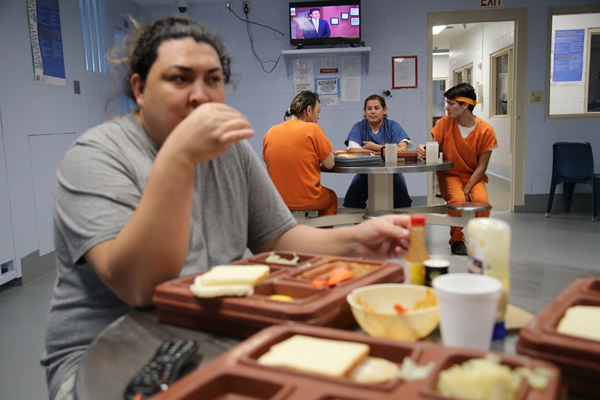
The unit also has its own outside recreation area where six detainees were playing volleyball with a male staffer from the Cibola County Correctional Center when the reporters were there.
Detainees stood along the wall as the staffer told the reporters they have planted flowers in a small garden that was a few feet away from them. Other staffers said during the tour the detainees also have access to Zumba classes, an arts and crafts program and classes at the unit’s beauty salon.
A Univision newscast with a story about the Trump administration’s agreement with Mexico to stop migrants from entering the U.S. was on a television in one of the unit’s day rooms during the tour.
Bulletin boards throughout the unit had notices that detailed schedules for laundry and religious services. One flyer had a Kosher food menus that included a lunch with a peanut butter and jelly sandwich, canned vegetables, bread or crackers, fresh or canned fruit, Droxie cookies and beverages.
Posters in English and Spanish that read, “ICE has zero-tolerance for sexual abuse” and “Are you detained and separated from your child/children?” were visible throughout the facility.
One poster read, “I have a right to be treated fairly, regardless of my sexual orientation or gender identity.” Signs above the entrance to each unit read, “opposite gender must announce upon entry.”
Reporters also visited a gymnasium with basketball hoops and exercise equipment. Judd said the trans detainees have access to it and a large, outdoor recreation yard with a track and soccer field.
“This affords them the opportunity to come outside each day to get some fresh air,” she said.
The reporters also visited the facility’s medical unit which has exam rooms, dental suites and areas where detainees with Tuberculosis and other comunicable diseases can be isolated.
“We stay busy, but we enjoy what we do,” said Cibola County Correctional Center Health Services Administrator Wendy Baca.
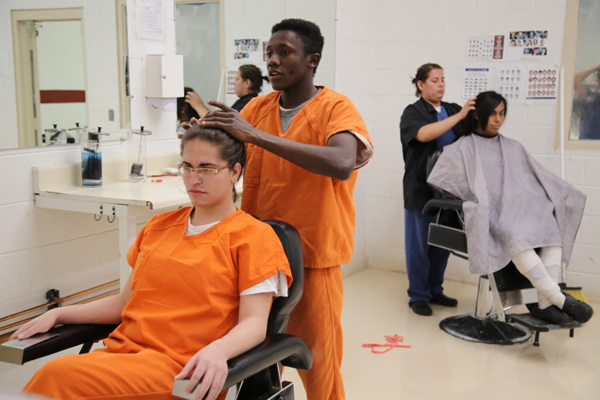
Private company operates facility
CoreCivic, a private company that was once known as the Corrections Corporation of America, operates the minimum-security men’s facility that is roughly 80 miles west of Albuquerque in rural Cibola County.
The facility also houses cisgender men who are in the custody of ICE, the U.S. Marshals and Cibola County.
The trans unit opened in 2017 after ICE’s contract with the Santa Ana Jail in Orange County, Calif., which had a unit only for trans detainees, ended. Judd told the reporters the trans unit can house up to 60 detainees at a time.
Wednesday’s took place less than 13 months after Roxsana Hernández, a trans Honduran woman with HIV who had been briefly detained at the Cibola County Correctional Center, died in ICE custody at Lovelace Medical Center in Albuquerque.
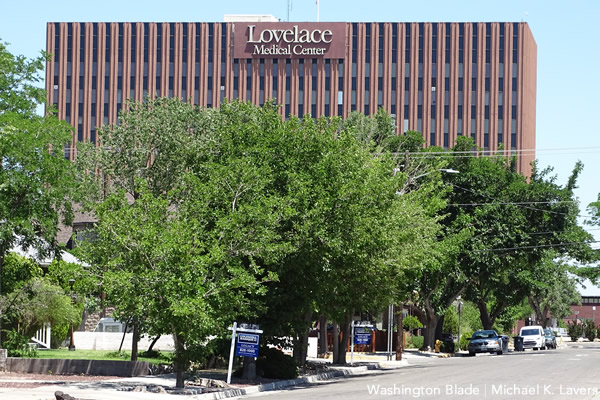
Alejandra, a prominent trans rights activist from El Salvador who has been in ICE custody since 2017, remains detained at the facility. Nicole García Aguilar, a trans Honduran woman who the U.S. has granted asylum, was released from the Cibola County Correctional Center on Wednesday.
Johana “Joa” Medina Leon, a trans woman from El Salvador, died at an El Paso hospital on June 1, shortly after ICE released her from their custody.
Medina had been detained at the Otero County Processing Center in Chaparral, N.M. A dozen gay men and trans women who were in ICE custody at the same facility earlier this year alleged they suffered abuse while in detention.
The Blade on Tuesday spoke with three trans women from Mexico and El Salvador who were previously detained at the Cibola County Correctional Center.
Johely, who was born in Mexico’s Nayarit state, said during an interview at the offices of the Santa Fe Dreamers Project, an Albuquerque-based organization that advocates on behalf of immigrants, she was in ICE custody at the facility from Aug. 19, 2018, to Jan. 25.
Johely told the Blade she did not receive adequate treatment for her Type 2 diabetes and the facility’s medical personnel “do not have the resources to give medications.” Johely said the facility’s staff were “very racist” and “not trained to care for a transgender person.”
Johely and the other two trans women — Ginger, who was released from ICE custody on Monday, and Daniela, who left the facility on June 7, — also complained about the facility’s food.
“We are lucky to leave this place alive,” Johely told the Blade.
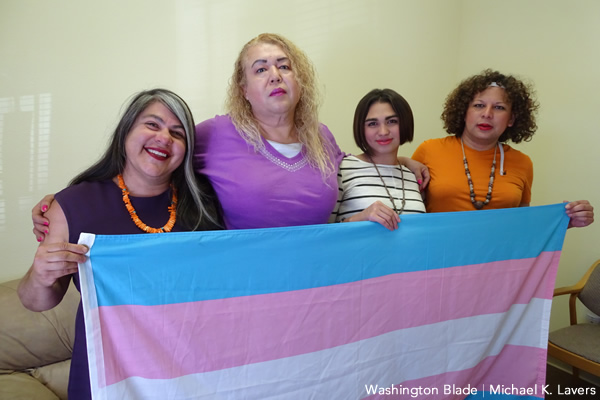
ICE officials defend treatment trans detainees
ICE officials have repeatedly defended its treatment of trans people in their custody.
A 2015 memorandum then-ICE Executive Associate Director of Enforcement and Removal Operations Thomas Homan signed requires personnel to allow trans detainees to identify themselves based on their gender identity on data forms. The directive, among other things, also contains guidelines for a “respectful, safe and secure environment” for trans detainees and requires detention facilities to provide them with access to hormone therapy and other trans-specific health care.
Johely, Ginger and Daniela all said they all received hormones while in ICE custody at the Cibola County Correctional Center. Baca told the Blade access to them is determined “between the provider and the patient” and personnel monitor the amount they receive each month.
ACLU of New Mexico Staff Attorney Kristin Greer Love on Tuesday sharply criticized ICE over the treatment of trans women who are in their custody.
“It strains the imagination that ICE can even say out loud that they’re providing adequate medical care when there’s so many documented reports and tragic deaths that were likely preventable in ICE detention,” she told the Blade during an interview at her office in downtown Albuquerque.
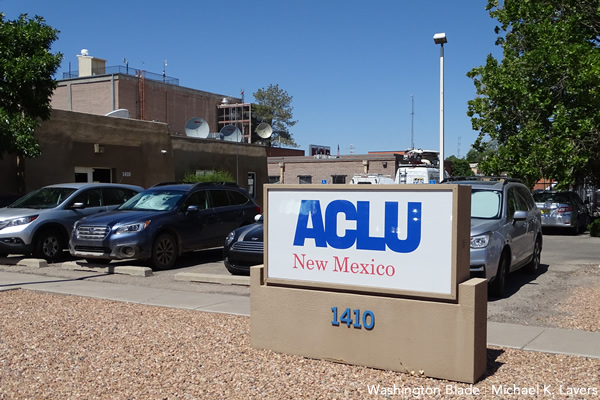
Price told the Blade after the tour that ICE’s food standards are “very rigorous.”
Two Cibola County Correctional Center employees with bags of takeout entered the conference room in which Price was speaking to the reporters after the tour, entered their offices and closed the doors behind them. Price also defended the medical care that trans detainees receive while in ICE custody.
“Medical is something we take very, very seriously,” he said.
Story courtesy of the Washington Blade.

